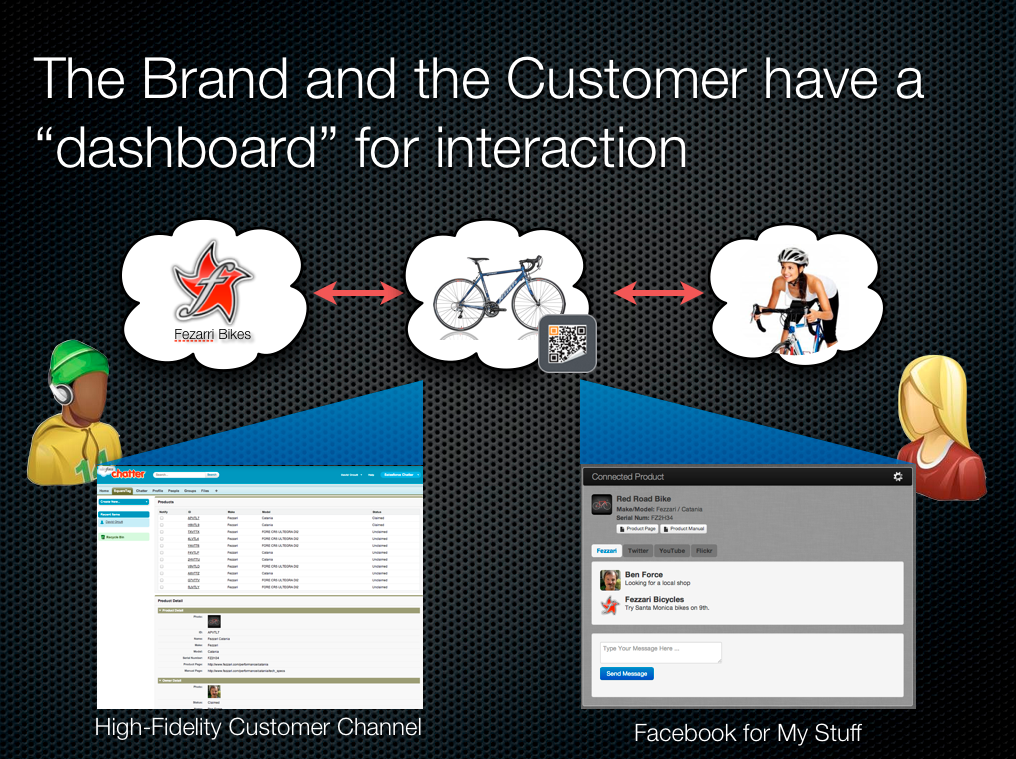Summary
SquareTag is a social product platform. Social products have relationships with owners, manufacturers, and others. Social products promise to make things more useful and reduce the total cost of ownership.
In a blog post from 2011, I transcribed a quote from a keynote by Marc Benioff where he says:
"The car needs to become your friend. How does the car speak to me? How does the car integrate with the dealership and the factory? How does the car help me get to the service station? ... I want a relationship with the car in the same way I have a relationship with my friends. ... The car is going to become social. All our products are going to become social." (emphasis mine)
I went on to describe what I thought it meant to create a "Facebook of things" where products and services could "be social."
Two years on, we've made tremendous progress on that vision. We've built a social product platform that we call SquareTag. Over the last four months, the feedback we've gotten from users has given us a better idea of what it takes to make SquareTag useful and interesting. Our vision for SquareTag is a tool that helps people enjoy their things more and reduces the headache of ownership.
For a thing to be social, it needs relationships. Social products don't just have relationships with their owner. They might, for example, have relationships with other, related things or people. One of the primary relationships that my things have is with the company or person who designed and made them. For many things, another key relationship is with the service agents who maintain them. Manufacturers—brands—and service agents can do a lot to help me reduce the effort and expense of owning things and get more satisfaction from the experience. And that, in turn, makes it easier for me to buy and own more.
Even though both the manufacturer and I both have a relationship with something, our viewpoints are very different: a company side and a people side. As the owner, I have the primary relationship, but I want the manufacturer to be able to share useful things like warranty and recall notices, replacement parts, enhancements, new releases, related articles, and so on. And I want to be able to ask questions, find information, look for service agents, buy replacement parts and accessories, share experiences with my friends, offer the thing for sale and so on.
When I talk about the people side and the company side, I really mean just that. Any product is a place where companies and people come together: a common interest upon which they can establish a relationship. I use the following picture in discussions about SquareTag to illustrate that point:

If you can imagine a bike, or anything else, having it's own place online, the customer and the company both have a different, but connected view of that product. We think that for companies it looks much like customer relationship management (CRM), which is why we've built a SalesForce.com integration to show that side off.
The owner's side looks and feels like a Facebook wall where messaging and other interactions happen in the context of the thing itself. Things have profiles that they share with other like things. The profile contains pictures, product Web pages, manuals, how to videos, and other useful information. But the product profile is individual—made for a single instance of the product. It also contains information specific to that thing such as custom configurations, serial numbers, purchase history, maintenance history, and relationships to anyone or anything that is relevant. One of the most interesting thing that the product profile holds is notifications, reminders, and other interactions with the things and people it has relationships with.
SquareTag is, as I said, a social product platform, designed to support a multitude of uses. While it remains in beta and we continue to tweak it to better suit the vision we have for it, SquareTag is available now and free to use. Sign up and let us know what you'd like to do with it.




